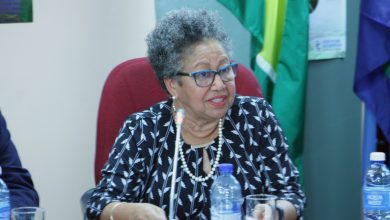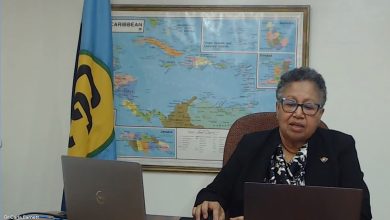The Board of Directors of the Caribbean Agricultural Health and Food Safety (CAHFSA), a Regional institution, held its third meeting at the Caribbean Community (CARICOM) Secretariat from November 17-19, 2014.
The Chairman of the Board is Ms. Audine Mootoo of Trinidad and Tobago. Other members are: Dr. Helena Browne of Antigua and Barbuda, Dr. Beverley Wood of Barbados, Mr. Emir Cruz of Belize,, Mr. Ryan Anselm of Dominica, Dr. Bowen Louisan of Grenada, Dr. Dindyal Permaul of Guyana, Dr. Max Millien of Haiti, Mr. Thomas Jackson of St. Kitts and Nevis, Dr. Auria King of Saint Lucia, Dr. Kathian Hackshaw of St. Vincent and the Grenadines, Mr. Rajendrekoemar Debie of Suriname, Ms. Sheila Harvey of Jamaica, and Mr. Claude Brown of Montserrat.
The Board has been working closely with the CARICOM Secretariat in developing the rules and procedures, the administrative structure and the strategic plan of CAHFSA. The agency became operational in October 2014, with the appointment of its Chief Executive Officer, Mr. Lindley Collins. His appointment was announced during Caribbean Week of Agriculture 2014 which was held in Suriname, where CAHFSA’s offices are located.
Mr. Collins is a food scientist by profession, with 25 years of rich experience in all facets of standardization, quality control, food safety, and product development. Prior to joining CAHFSA, he was Director of the Grenada Bureau of Standards for five years and also worked with the Caribbean Regional Organisation for Standards and Quality (CROSQ).
In a brief interview at the CWA 2014, Mr. Collins indicated that among his priorities was the establishment of an operational plan that secured the Region’s agricultural health and ensured its citizens of safe and healthy food. He added that this would entail, inter alia, the updating and harmonization of laws across the Community, the strengthening of national institutions and physical facilities and the training of personnel to allow the Region to effect Articles 57 and 74 of Revised Treaty of Chaguaramas and to meet its obligations under the World Trade Organisation (WTO) Sanitary and Phyto Sanitary (SPS) requirements.
Mr. Collins explained that the WTO SPS agreement requires that countries conform to SPS laws, standards and guidelines that are internationally recognized. Workforce training, upgrading of national laboratories to conduct the required tests are also among the priorities.
The Agreement establishing CAHFSA was approved in Roseau, Dominica, at the Twenty-First Inter-sessional Meeting of the Conference of Heads of Government. CAHFSA’s operations are vital to fulfilling the provisions of the Treaty of Chaguaramas which call for the establishment of effective Sanitary and Phyto-Sanitary (SPS) regime and for the harmonization of laws, administrative practices and procedures in respect of agriculture. Agricultural Health and Food Safety has been identified by the Council of Trade and Economic Development (COTED) as a key thematic focal area that must be addressed to remove the non-tariff measures (NTMs) that impede the trade of agricultural products both intra-regionally and extra-regionally.
CAHFSA is expected to lead the Region’s efforts to remove the technical and administrative NTMs that will support the expansion of agricultural production and trade. In its inception stages, the agency will benefit from the 10th EDF Economic Partnership Agreement SPS Programme (‘SPS Measures’ and ‘SPS Measures for Fisheries’), which is being implemented by the Inter-American Institute for Cooperation on Agriculture (IICA) on behalf of CARIFORUM, with the CARICOM Secretariat, and the Caribbean Regional Fisheries Mechanism (CRFM) as the key co–implementers for CARICOM.






